This is where we are.

Blah, blah, tribalism, blah, blah. I know you’re sick of hearing me talk about it.
This says something more, though. Our thirst for incriminating news about “the others” – or the desire to tune out bad news about “our own” – is a hallmark of our modern culture. It would be easy to blame the media (which I’m often quick to do) for being imbalanced. Surely, MSNBC devoted less attention to Biden’s document scandal, and Fox, vice versa.
But those outlets are just giving audiences what they want. We can see it empirically in their Nielsen ratings and web analytics. Red meat drives eyeballs, which drive ad dollars, which prevent layoffs. Maybe ad-supported media trained consumers to be this way or maybe they’re just reacting to human nature. Chicken, egg.
It’s no longer enough to say “Both sides were wrong and should be held accountable.” There are few things I get yelled at for more on social media – or in chastising replies to this very email – than the sin of equivalency. People are gifted at spinning details or nuance to justify the relative superiority of their team. We feel better by knocking others down.
And, thus, we spend far less time talking about how to solve problems and far more time arguing over who’s to blame. It even sometimes seems like people would rather a problem persists, so long as the blame is squarely on the other guy. We score more points by dunking on our opponents than by actually winning the game.
Perhaps worst of all, by quibbling over documents, balloons, and the Super Bowl pregame show, we draw our attention away from real, significant problems. It’s too hard to talk about fentanyl, the lack of hope today’s kids have for the future, or the culture of violence and hostility sweeping across our country. You can’t just lock those problems in a safe, shoot them down, or turn off the TV to make them go away. And everyone is to blame.
In a world where attention is our most precious currency, and culpability, our greatest dread, I don’t know how we get people tuned into problems that require both thoughtful time and mutual accountability. The answer feels far away, I’m afraid.
Here’s what we’re seeing:
Warning: Looking at our consumer confidence numbers could cause the bends. I certainly didn’t expect this to happen – which pretty much sums up every economic indicator over the past several months the pundits have called “unexpected.” Anyone who tells you they know where the economy is going, most of all a random sample of 10,000 U.S. adults, is delusional. Nonetheless, the collective hope emanating from our Economic Sentiment Index this week is undeniable. Whether it was because of the baller jobs report, slowing inflation, or stronger (“than expected”) January retail spending, people feel more optimistic about the economy than they have since Russia invaded Ukraine.
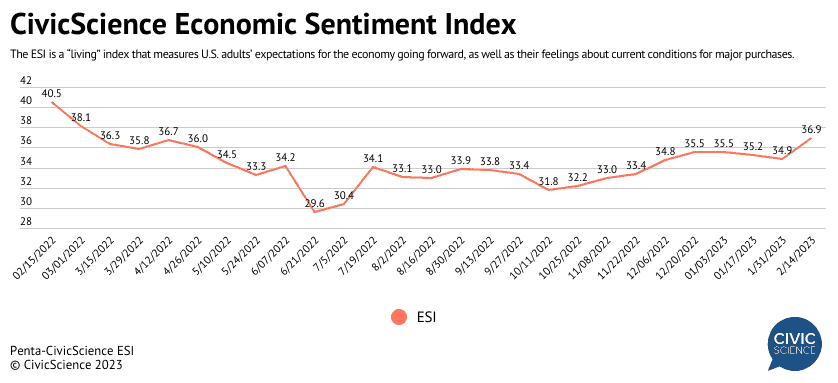
More Hispanic Americans – compared to non-Hispanics – report being better off financially since the beginning of the pandemic. In the first of a series of studies on America’s vibrant Hispanic population (thanks to my dear friend Roberto Ruiz at Univision for the inspiration), we explored some of the more interesting financial insights we uncovered in our data. Chief among them, 40% of Hispanics report being better off economically since the start of the pandemic, versus just 30% of the Gen Pop. To be fair, they are also slightly more likely to say they’re worse off (33% vs. 35%). Overall, Hispanics are more optimistic about their personal economic situation and, thus, more likely to evolve their financial behaviors, by doing things like switching banks or investing in crypto.
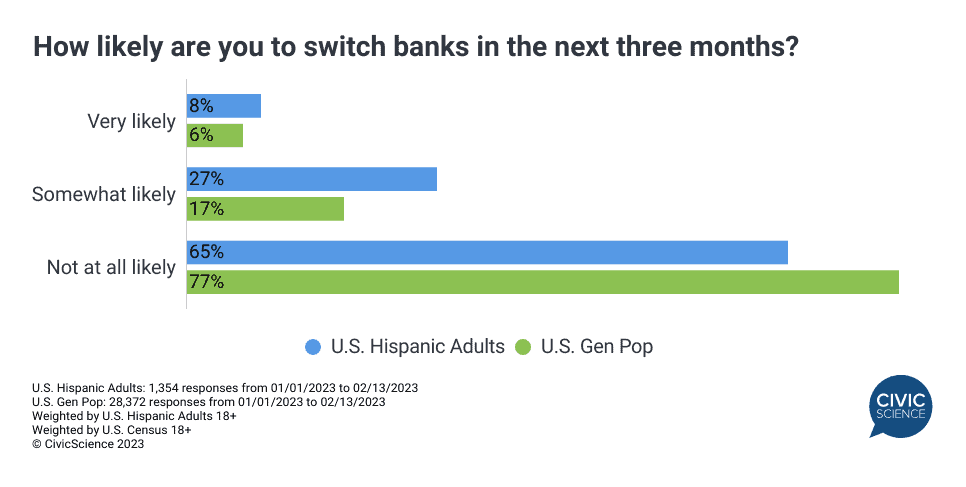
This winter is really bringing us down. Thirty-seven percent of U.S. adults this week reported that they or someone in their household suffers from Seasonal Affective Disorder (“SAD,” which is an uncannily perfect acronym), up from 34% last year. The numbers climb dramatically among Gen Z and Millennials. The number one remedy people look to is exercise, but the percentage who rely on medication showed the highest YoY jump (up 20%). If you’ve seen my newest What We’re Seeing executive leadership talk, you know that wellness and self-care is one of the most important trends affecting retail, travel, dining, and everything in between right now. This is just more fodder for that.
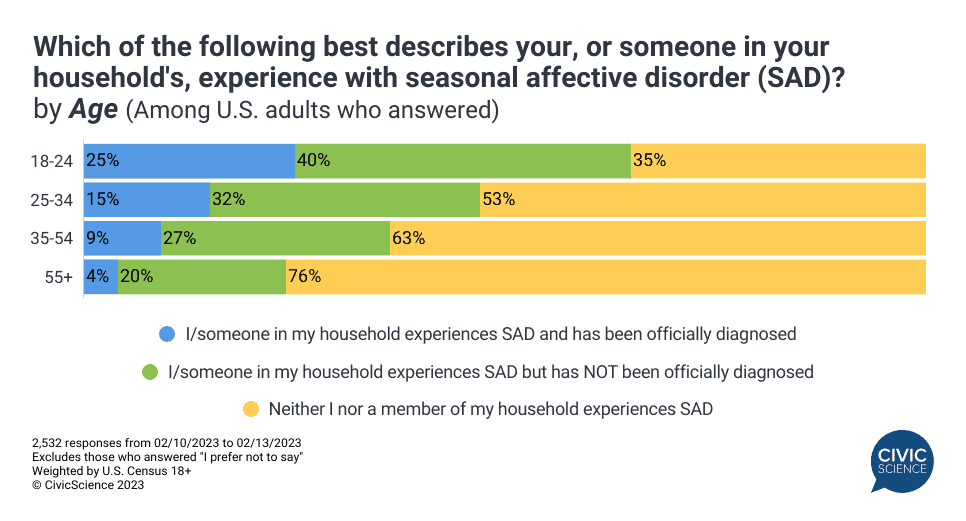
More Americans celebrated Valentine’s Day at a restaurant this year. Just over half of U.S. adults planned to observe the V-Day “holiday” this year – Tara and I have always been in the other half – down ever slightly from last year. Restaurant dining increased as a preferred activity for the second straight year, but still well below pre-pandemic norms. Naturally, the data varied widely by age group. No surprise, there’s a crazy high correlation among people who value the importance of V-Day and those who watch The Bachelor. And, in a related study on Galentine’s Day, we found a big jump in the percentage of adult women who said they planned to purchase a gift for themselves this year. Yet more evidence of the big trend in self-care.
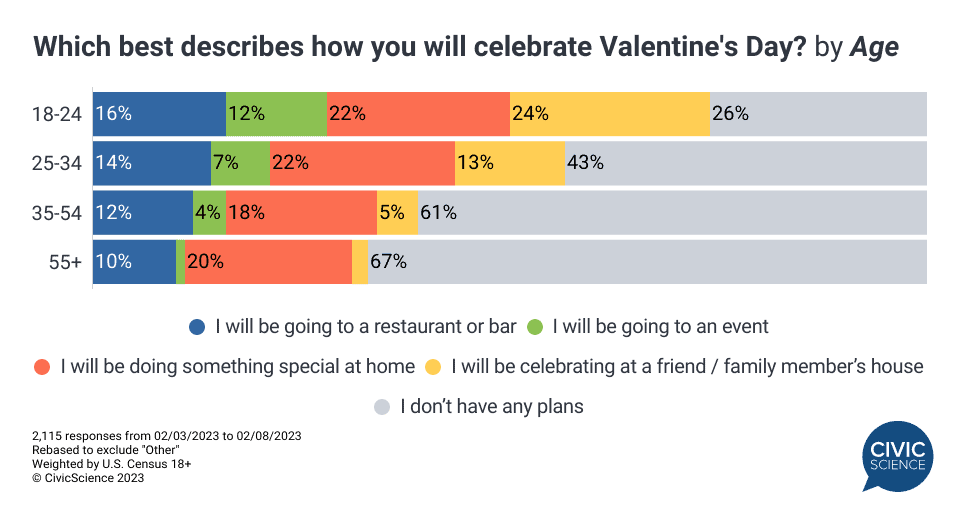
Apparently, it’s obligatory for every research company to publish its data on the most popular Super Bowl commercials, so we did too. You can see the results here or I can just tell you that Dunkin’ took the top spot overall and Blue Moon grabbed the honors in the beer category. Maybe most useful is the fact that over 1 in 4 viewers said one or more ads influenced their opinion of the advertiser – but positive and negative influence was mixed.
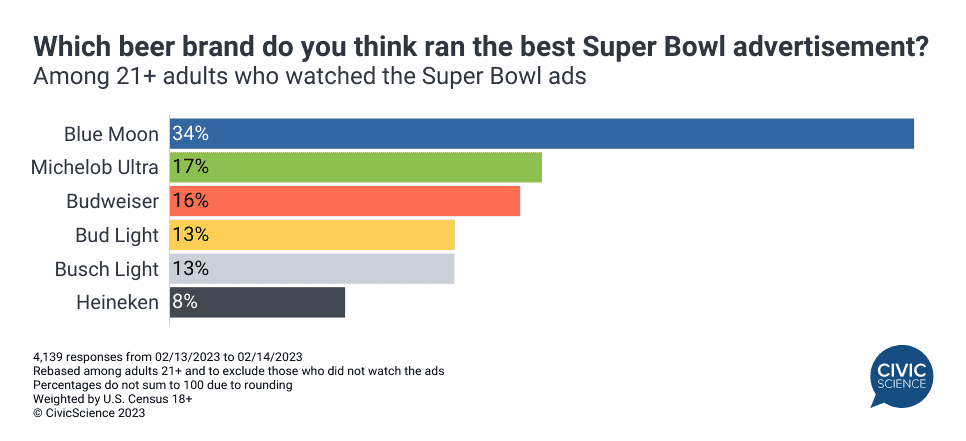
(Quick aside: Show me what you think is a better all-time anthem than Chris Stapleton’s and I’ll show you one that was pre-recorded and lip-synched. Watch it, if you haven’t. Then watch it again.)
More great intel from our new InsightStore:
- A lot of Gen Zers are planning to travel over the next month and here are five things you need to know about them;
- The East Palestine train derailment has driven trust in government leadership even further into the toilet;
- In our 3 Things to Know this week, people were super divided on the President’s SOTU Address – shocker!;
- We could see a surge in non-alcoholic beer this year (just not in my house);
- As we head into All-Star weekend, LeBron James is still the NBA’s most popular player (followed closely by Steph Curry).
Our Most Popular Questions This Week
- Would you accept a professional makeover if offered one?
- Do you tend to leave social functions earlier or later than most others?
- Have you ever broken a bone?
- If you won the lottery, would you do so publicly or anonymously?
- Batch cocktails: into them or over them?
- Would you say you have a better or worse attention span than other people?
Answer Key: I haven’t changed my hairstyle since I was 12, so no; Depends but usually later; Several; Publicly as hell; All cocktails, yes; I’m sorry, what was the question?
Hoping you’re well.
JD
PS: If you’re a journalist looking for quick-turn data on current events, sign up for our new Press Pass newsletter here.








